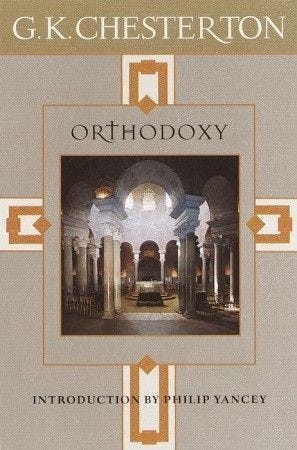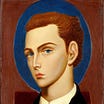Greetings, my fellow bibliophiles!
Today, I’m excited to bring you
.Peter writes
, where he is crafting a toolbox of ideas for those who dream of a world without capitalism or the state.Here, he discusses the unlikely book that first turned him onto the path towards anarchism.
—
It would probably horrify G.K. Chesterton, a Roman Catholic apologist straddling the turn of the 20th century, to know that one of his closest readers is a queer anarchist apostate. But this jolly jester was quite comfortable with paradox: if he found two truths in seeming contradiction, he would take the truths and the contradiction with them. Chesterton claims this dynamic balance is the soul of Christian orthodoxy; I’ve carried it close even as I made my escape from fundamentalism into a lifestyle of degeneracy and rebellion. Orthodoxy is a spiritual autobiography, detailing the author’s conversion process from skeptical agnostic to proponent of the faith. I’ve followed his footsteps exactly to the letter — only, I’ve gone in reverse.
I discovered this book in 11th grade, in my now-defunct private Christian high school that rented space from a church. It was assigned reading for a class on the Inklings, a British literary group that included C.S. Lewis and J.R.R. Tolkien, as well as Charles Williams, Owen Barfield, and Dorothy Day.
On my first read-through I understood nothing, but had the powerful impression that this was a book I must understand. What struck me first was the poetry of the prose: full of fairy tales, solipsists, blue tigers, and alliteration, Orthodoxy is a romantic romp through the world of modernist thought. The sentences run singing down the page, springing lightly from image to image, held together by meticulous metaphor and resonant structure:
[A]nother symbol from physical nature will express sufficiently well the real place of mysticism before mankind. The one created thing which we cannot look at is the one thing in the light of which we look at everything. Like the sun at noonday, mysticism explains everything else by the blaze of its own victorious invisibility... We are conscious of it as of a kind of splendid confusion; it is something both shining and shapeless, at once a blaze and a blur. (Chapter 2: The Maniac)
What gripped me next was the plot of a novel he never got around to writing, which he spoiled for the sake of argument: that of a daring yachtsman who sets off to find the East Indies but gets turned around and finds Britain instead. The central theme of his book is captured in the exquisite paradox of feeling at once the thrill of adventure and the relief of homecoming.
As the young gay son of a pastor, I felt homeless at home, like an unwitting enemy agent. People would speak to me with no idea what I was. It’s still hard to pinpoint how the fear and shame got in, since no adult in my life explicitly condemned gay people. But everyone understood that being gay, actually doing something with those feelings, was a hellish thing.
That alienness is why I felt the constant urge to confess. I bought hugs with tears, intimacy with abasement. To prove I was man not monster, I threw myself into church life: Sunday service, Tuesday bible study, Wednesday worship night, Friday youth program, summer and winter camps, spring break retreats. I nearly memorized the Book of James (the one Martin Luther considered unfit for the canon).
In all those church spaces persisted the note that we were a people set apart, strangers in a strange land, on a mission to subvert an upside-down world corrupted by sin and governed by the devil. Christians were always the underdog, yet assured that our final victory was inevitable. But this specialness was never reflected in the mundanity of daily life. We lived just like everyone else, despite pretending to be “in this world but not of it.”
Chesterton gives a strange reason for wanting to change something: he says that in the act of creation, God cleaved the cosmos from himself. This fundamental separation is what allows both free will and love to be real. There can be no beauty to behold if there is no separation between the beautiful and the beholder. Building on this, Chesterton rejects both optimism and pessimism as motivation for change, offering instead the cosmic patriot, who has a loyalty to life through love: “A man belongs to this world before he begins to ask if it is nice to belong to it.”
When we love without condition, we are willing to wreck the world for love’s sake. But precisely when we resort to a reason for loving something, as if we stood outside the world like house-hunters measuring its pros and cons, we end up sacrificing the thing itself for an abstract idea of it. “Love is not blind,” Chesterton insists, “that is the last thing that it is. Love is bound; and the more it is bound the less it is blind.”
The church certainly had me bound. And yet I could not remain blind. I had to make a choice: the church, or my body. After years of conversion therapy, I began to realize I couldn’t have both.
I grew sick of introspection, languishing in my journal instead of facing things directly. I would call my best friend on the weekends, with whom I was desperately in love, and if he didn’t answer I would pace under the eucalyptus trees at the end of our cul-de-sac and feel trapped.
When I told my friend from the youth center, during a winter break trip under somber pines, that I was attracted to him, he asked “is there anything I can do differently?” I faltered under the layers. How could I express that his whole being reverberated, drawing me in with its magnetism, that every move and gesture he made, the cadence of his voice, the curve of his spine, was like water in a parched land?
I realized neither these boys nor the church who birthed me could understand or receive my love. It was alien to them. Most of all, I needed that primal loyalty to my own body that Chesterton describes in the cosmic patriot. I couldn’t love it only on the condition that I castrate its unique shape, force it into a straitjacket mold.
So I left. I set off in a little yacht (an Amway train) to a faraway land (the Midwest) for college. There I met other queer people, and left the country to study abroad, and became drawn to radical politics, and found Christians in every milieu I encountered. People said I seemed different when I returned to finish my degree, more at home in my skin.
And I was. The old melancholy rarely resurfaced, and my relationship to bodies, mine and others, had never been healthier. After a series of traumas caused the last articles of my faith to crumble, I stumbled upon an anarchist collective (CrimethInc) and an online primer (Anarchy Works), the exploration of which left me feeling more at home than ever.
Returning to Orthodoxy after years away is a strange nostalgia. I still love the language, the playful prose, the way Chesterton flits lightly over his references, answering opponents with a wink and a nod.
I’m convinced the man himself had ADHD (like me!). His intensely visual reasoning, his involved metaphors, the way he gets at the frustrating overwhelm of trying to express something of which you’re entirely convinced. He was also consistently disorganized, always late, and frequently lost. Like retroactively recognizing gay figures in history, knowing Chesterton blazed through this world with a brain probably similar to mine is comforting.
And blaze he did: he was a prolific and versatile writer (he created the Father Brown mystery series and wrote upwards of 80 books, 200 short stories, 4,000 essays, hundreds of poems, and several plays), he was a spirited debater and radio broadcaster (the BBC remarked after his death that “he [might] have become the dominating voice from Broadcasting House”), and he left an indelible mark on English literature (nominated for a Nobel in 1935).
To my own surprise, I still basically believe everything I did when Chesterton’s Orthodoxy first threw open the shutters and let the light in. I still think the rationalists are wrong to think we can fit the heavens into our heads, and the mystics right to have their heads in the clouds. I still think it says more about modern life than it does about Christianity to attack it for being too meek but too violent, too gaudy but too plain. I still think progress is a myth, that the rich cannot be trusted, that humans are both good and evil not one or the other.
I also believe that we have the power, the freedom, and the obligation to try to save a thing if we love it. As cosmic patriots, loyal to real people not abstractions, we can wreck the whole world for the sake of itself.
P.S. For more ways of getting your writing in front of new readers, consider becoming a paying subscriber today.








It disturbs me profoundly that so many who call themselves Christian fail at the two most important things Jesus said (Matthew, 22:37-40).
“Love God with everything you are.” (Subtext: Know yourself, and love God with all of it.)
“Love others as you love yourself.” (Subtext: Love yourself so that you can love others.)
“Everything depends on these two commandments.” (Subtext: If you’re following a law that does not support love, you’re doing something wrong.)
The lesson here is not that gay people should see their homosexuality as a test of faith. If God is Love, and Jesus is God incarnate, then if there’s a test it’s one of love.
So here’s the test, and it’s for everyone: We are to love others whether or not the way God made them makes us uncomfortable; and as for those others, their test is to love us, even when we fail.
While I am neither a believer nor a queer, I think I can understand this double predicament.
Being lost looking for an identity. I am still not sure I found mine, I may have just learned to live with the discomfort. In any case, I appreciate to see this second review on this Substack dealing with the issue of faith. It's fascinating to me.